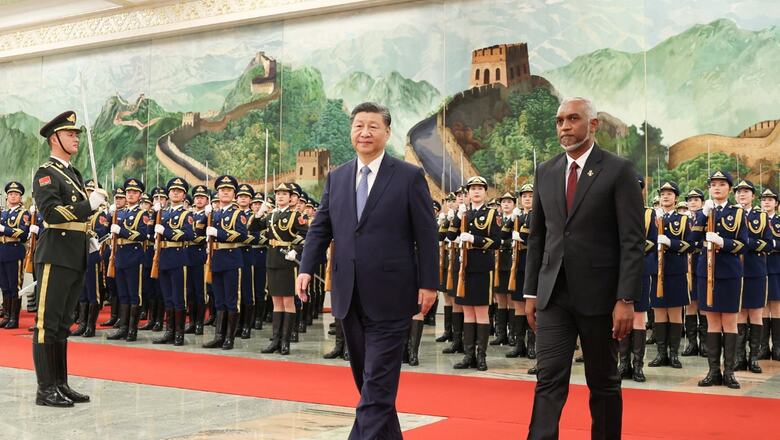
views
Maldives is in the news for all the wrong reasons. It’s not just the public insults by its sitting ministers against India and its prime minister. It’s also that President Mohamed Muizzu made a deliberate decision to prioritise ties with Beijing and its camp followers in the region, rather than the traditional courtesy extended of visiting India first. The latter is a free choice of a sovereign country, however unwise. The former was completely unacceptable. Both are symptoms of a larger malaise. It’s time to take note.
Muizzu’s bent of mind
That visit to China was a foregone event given the heavily anti-India posture of Muizzu during elections, not to mention his quick action to publicly announce that his government would end the minuscule presence of Indian service personnel on the island. On a personal note, he was the construction minister under the Presidency of Abdullah Yameen. In that post, he had more than $1 billion to play around with in terms of Chinese assistance to build housing projects and other massive infrastructure. He’s comfortable with the Chinese, just as his boss Yameen was.
There are unpleasant allegations of the slowness of Indian projects. For instance, the Indian-funded Greater Male connectivity project for a 6.74-km-long bridge and causeway link to connect Male with the adjoining islands of Villingli, Gulhifalhu and Thilafushi, was assessed by the present government as being only 29 per cent complete in November last year as against the required 81 per cent. But look closer.
At least a part of that delay was not only due to the pandemic, but also to land not being transferred for the project. China doesn’t seem to face that problem. Its Sinamalé bridge was built in a reported 33 months.
Lesson 1: China works its way into the bureaucracy of a country it befriends.
Call it corruption or not, it’s a reality. Anyway, there is no indication at all that Muizzu will stop Indian projects (as he clearly said) which come with grants (e.g. $100 million for the Greater Male project) and soft loans, unlike the expensive loans that China provides (almost all $1.2 billion of it). So, no, Indian development projects will still be welcomed. But quietly.
Security angle
What he is doing, however, is targeting security. It’s not just the small group of 77 military personnel, stationed there to keep two helicopters and a Dornier in service, mainly for casualty evacuation in the 1,000 islands that make up Maldives. His administration has not sent representations to the recent Colombo Security Conclave (CSC), a meeting of national security advisors and senior security.
The CSC grew out of bilateral bi-annual Maldives-India Coast Guard exercises starting in 1995. It became a trilateral after Sri Lanka joined in 2011. In 2021, it was formalised as CSC, based out of Colombo, with Mauritius joining as a member-state and Seychelles and Bangladesh as Observers.
It is unclear whether Maldives skipped the sixth meeting of the CSC due to a new government taking over just about two weeks earlier. But it still sent Vice President Latheef to China for the China-Indian Ocean Region Forum organised almost simultaneously in December 2023. Even worse, a significant plank of the CSC has also been set aside. Male has chosen not to renew the hydrography agreement, which permitted India to survey its territorial waters, mapping underwater surfaces and studying reefs, lagoons, and coastlines.
Its officials indicated that this was part of its overview of some 100 agreements, that “put the country’s sovereignty in danger”. That is strange because that data is shared with the host country for its own benefit. Meanwhile, India has provided the two Dhruv helicopters (supplied in 2013 and 2019) and a Dornier in 2020, and more recently a Fast Patrol boat, and a landing craft assault ship this year, in total there isn’t a lot of equipment. More potent is the setting up of a Composite Training Centre, a military hospital, and 10 coastal radar systems that feed into the International Fusion Centre.
If Male decides to remove that, it would strongly harm not just India, but the information bank that is at the heart of India’s ‘Indo-Pacific’ vision together with its other partner. But the truth is, as a sovereign nation, it has every right to do so.
Lesson 2: Dependencies are on both sides.
The Beijing trip
Which brings the whole to the Beijing visit. Unsurprisingly, the media in India picked up President Muizzu’s call for more Chinese tourists to visit his country, which he would have done anyway, given that tourism is the single major source of income. While the economy is projected to grow at a hefty growth of 6.5 per cent, it is also heavily in debt. Total public debt rose to $7.0 billion (113.5 per cent of GDP) at the end of 2022, as against $5.9 billion in the previous year. Muizzu is also facing an internal crisis as former President Yameen, who wants to control issues from the sidelines, is taking potshots at him.
Muizzu, who is on a five-day state visit to China, met President Xi Jinping on January 10 and signed 20 ‘key’ agreements, including one on tourism cooperation. On Thursday, he met Chinese Premier Li Qiang and discussed ways to increase the number of tourists from China to his tourism-dependent country. His first day was devoted to meeting businessmen and encouraging investment with a visit to Fuzhou, the gateway to the Maritime Silk Road.
Maldives joined the Belt and Road Initiative (BRI) in 2017, but had backed off on major projects under former President Solih. China’s ability to greatly increase its investments is in some doubt as its economy is under considerable stress; that will also apply to tourist arrivals. So far, the largest segments were from India and Russia (upwards of 2 lakh each) and China’s lower at about 1.8 lakh, according to the Maldives tourism ministry.
That’s a nice leverage to get what you really want, which is not sunbathing on the beach. That’s lesson three.
The aid map is changing
As the Global Times waspishly blamed India for playing a ‘regional boss’, there are other players who matter to the Maldives. The US sent a resident Ambassador only recently, and the visits of USAID officials and senior officials of the National Security Council dealing with climate change — a key issue for the Maldives — signifies that Washington is engaged, committing another $7.2 million in aid to a total of some $36 million. Australia’s budgeted a mere $2.8 million, and Japan’s overseas aid is reducing.
In this light is Muizzu’s search for new friends like Turkey who has committed to increasing defence ties with Male and the UAE who has provided budget support ($50 million) and recently $80 million for a much delayed airport project. None of these are anti-India, though Turkey has its issues on Kashmir. It is also in line with the President’s commitment to diversify not from just India, but also China, in line with his ‘Maldives first’ campaign. Given that China Development Bank, Industrial and Commercial Bank of China and Export-Import Bank of China hold more than 60 per cent of the Maldives’ sovereign debt, Muizzu’s desire to seek other sources is logical.
Our Indo-Pacific diplomacy needs to also factor in that the Ukraine and Gaza wars have changed that aid map. Lesson four.
A rather deliberate story is now around suggesting that the President’s office had already asked India for a visit in December 2023. That seems like damage control. Male knows well that while an ‘India Out’ campaign may gain some votes – though it did not seem to elicit any nationalistic fervour – it can hardly move away from its nearest neighbour from where it gets all its daily necessities. Besides, Solih’s party still has a majority in Parliament, thus limiting any drastic moves in foreign policy.
New Delhi has been playing its cards with great caution, welcoming the new Maldivian President and keeping its hands out of the social media mess, until the comments by the three ministers, summoning the envoy to express its displeasure. Expect more damage control from both sides in the near future, even as both sides realise that one cannot flourish without the other. It might also be wise to befriend all parties — as China does — regardless of their position on India.
Since Male is unlikely to get into a defence relationship with Beijing, all of this should be relatively easy. Meanwhile, watch out for any further eroding of security ties. And finally, Male should realise that under the Modi government, benefits are likely to increase, not the other way around as long as it plays its cards well. That ‘neighbourhood first’ doctrine is for real.
The writer is a Distinguished Fellow at the Institute of Peace and Conflict Studies, New Delhi. She tweets @kartha_tara. Views expressed in the above piece are personal and solely that of the author. They do not necessarily reflect News18’s views.




















Comments
0 comment